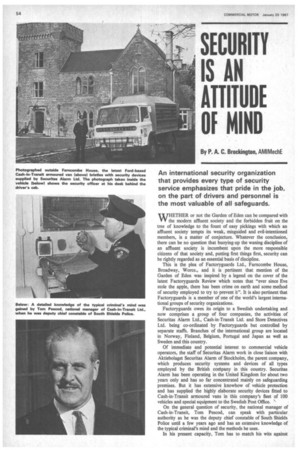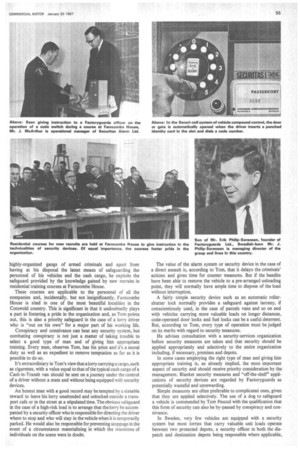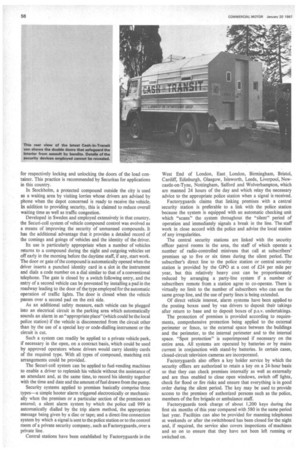SECURITY IS AN ATTITUDE OF MIND
Page 56

Page 57

Page 58

If you've noticed an error in this article please click here to report it so we can fix it.
By P. A. C. Brockington, AMIMechE An international security organization that provides every type of security service emphasizes that pride in the job, on the part of drivers and personnel is the most valuable of all safeguards.
WHETHER or not the Garden of Eden can be compared with the modern affluent society and the forbidden fruit on the tree of knowledge to the fount of easy pickings with which an affluent society tempts its weak, misguided and evil-intentioned members, is a matter of conjecture. Whatever the conclusion, there can be no question that buoying-up the waning discipline of an affluent society is incumbent upon the more responsible citizens of that society and, puffing first things first, security can be rightly regarded as an essential basis of discipline.
This is the plea of Factoryguards Ltd., Farncornbe House, Broadway, Worcs., and it is pertinent that mention of the Garden of Eden was inspired by a legend on the cover of the latest Factoryguards Review which notes that "ever since Eve stole the apple, there has been crime on earth and some method of security employed to try to prevent it". It is also pertinent that Factoryguards is a member of one of the world's largest international groups of security organizations.
Factoryguards owes its origin to a Swedish undertaking and now comprises a group of four companies, the activities of Securitas Alarm Ltd., Cash-in-Transit Ltd. and Store Detectives Ltd. being co-ordinated by Factoryguards but controlled by separate staffs. Branches of the international group are located in Norway, Finland, Belgium, Portugal and Japan as well as Sweden and this country.
Of immediate and potential interest to commercial vehicle operators, the staff of Securitas Alarm work in close liaison with Aktiebolaget Securitas Alarm of Stockholm, the parent company, which produces security systems and devices of all types employed by the British cornpany in this country. Securitas Alarm has been operating in the United Kingdom for about two years only and has so far concentrated mainly on safeguarding premises. But it has extensive knowhow of vehicle protection and has supplied the highly elaborate security devices fitted to Cash-in-Transit armoured vans in this company's fleet of 100 vehicles and special equipment to the Swedish Post Office.
On the general question of security, the national manager of Cash-in-Transit, Tom Pescod, can speak with particular authority as he was the deputy chief constable of South Shields Police until a few years ago and has an extensive knowledge of the typical criminal's mind and the methods he uses.
In his present capacity, Tom has to match his wits against highly-organized gangs of armed criminals and apart from having at his disposal the latest means of safeguarding the personnel of his vehicles and the cash cargo, he exploits the safeguard provided by the knowledge gained by new recruits in residential training courses at Farncombe House.
These courses are applicable to the personnel of all the companies and, incidentally, but not insignificantly, Farncombe House is sited in one of the most beautiful localities in the Cotswold country. This is significant in that it undoubtedly plays a part in fostering a pride in the organization and, as Tom points out, this is also a priority safeguard in the case of a lorry driver who is "out on his own" for a major part of his working life.
Conspiracy and connivance can beat any security system, but combating conspiracy is not just a matter of taking trouble to select a good type of man and of giving him appropriate training. Every man, observes Tom, has his price and it's a moral duty as well as an expedient to remove temptation as far as it is possible to do so.
It's extraordinary in Tom's view that alorry carrying acargo, such as cigarettes, with a value equal to that of the typical cash cargo of a Cash-in-Transit van should be sent on a journey under the control of a driver without a mate and without being equipped with security devices.
An honest man with a good record may be tempted by a sizeable reward to leave his lorry unattended and unlocked outside a transport cafe or in the street at a stipulated time. The obvious safeguard in the case of a high-risk load is to arrange that the lorry be accompanied by a security officer who is responsible for directing the driver where to stop and who will stay in the vehicle when it is temporarily parked. He would also be responsible for preventing stoppage in the event of a circumstance materializing in which the intentions of individuals on the scene were in doubt. The value of the alarm system or security device in the case of a direct assault is, according to Tom, that it delays the criminals' actions and gives time for counter measures. But if the bandits have been able to remove the vehicle to a pre-arranged unloading point, they will normally have ample time to dispose of the load without interruption.
A fairly simple security device such as an automatic rollershutter lock normally provides a safeguard against larceny, if conscientiously used, in the case of parcels vans and so on and with vehicles carrying more valuable loads on longer distances, code-operated door locks and fuel locks can be a useful deterrent. But, according to Tom, every type of operation must be judged on its merits with regard to security measures.
• He advises consultation with a security-services organization before security measures are taken and that security should be applied appropriately and selectively to the entire organization including, if necessary, premises and depots.
In some cases employing the right type of man and giving him appropriate training is, as already implied, the most important aspect of security and should receive priority consideration by the management. Blanket security measures and "off-the-shelf" applications of security devices are regarded by Factoryguards as potentially wasteful and unrewarding.
Simple measures are often preferable to complicated ones, given that they are applied selectively. The use of a dog to safeguard a vehicle is commended by Tom Pescod with the qualification that this form of security can also be by-passed by conspiracy and connivance.
In Sweden, very few vehicles are equipped with a security system but most lorries that carry valuable unit loads operate between two protected depots, a security officer in both the dispatch and destination depots being responsible where applicable, for respectively locking and unlocking the doors of the load container. This practice is recommended by Securitas for applications in this country.
In Stockholm, a protected compound outside the city is used as a waiting area by visiting lorries whose drivers are advised by phone when the depot concerned is ready to receive the vehicle. In addition to providing security, this is claimed to reduce overall waiting time as well as traffic congestion.
Developed in Sweden and employed extensively in that country, the Securi-coll system of vehicle compound control was evolved as a means of improving the security of unmanned compounds. It has the additional advantage that it provides a detailed record of the comings and goings of vehicles and the identity of the driver.
Its use is particularly appropriate when a number of vehicles returns to a compound during the night and outgoing vehicles set off early in the morning before the daytime staff, if any, start work. The door or gate of the compound is automatically opened when the driver inserts a punched identity card in a slot in the instrument and dials a code number on a dial similar to that of a conventional telephone. The gate is closed by a switch following entry, and the entry of a second vehicle can be prevented by installing a pad in the roadway leading to the door of the type employed for the automatic operation of traffic lights. The door is closed when the vehicle passes over a second pad on the exit side.
As an additional safety measure, each vehicle can be plugged into an electrical circuit in the parking area which automatically sounds an alarm in an "appropriate place" (which could be the local police station) if the vehicle is disconnected from the circuit other than by the use of a special key or code-dialling instrument or the circuit is cut.
Such a system can readily be applied to a private vehicle park, if necessary in the open, on a contract basis, which could be used by approved operators whose drivers would carry identity cards of the required type. With all types of compound, matching exit arrangements could be provided.
The Securi-coll system can be applied to fuel-vending machines to enable a driver to replenish his vehicle without the assistance of an attendant and, at the same time, to record his identity together with the time and date and the amount of fuel drawn from the pump.
Security systems applied to premises basically comprise three types—a simple hooter alarm triggered electronically or mechanically when the premises or a particular section of the premises are entered; a silent alarm system by which the police call 999 is automatically dialled by the trip alarm method, the appropriate message being given by a disc or tape; and a direct-line connection system by which a signal is sent to the police station or to the control room of a private security company, such as Factoryguards, over a private line.
Central stations have been established by Factoryguards in the
West End of London, East London, Birmingham, Bristol, Cardiff, Edinburgh, Glasgow, Isleworth, Leeds, Liverpool, Newcastle-on-Tyne, Nottingham, Salford And Wolverhampton, which are manned 24 hours of the day and which relay the necessary advice to the appropriate police station when a signal is received.
Factoryguards claims that linking premises with a central security station is preferable to a link with the police station because the system is equipped with an automatic checking unit which "scans" the system throughout the "silent" period of operation and immediately signals a break in the line. The staff work in close accord with the police and advise the local station of any irregularities.
The central security stations are linked with the security officer patrol rooms in the area, the staff of which operate a number of radio-controlled minivans that call at subscribers' premises up to five or six times during the silent period. The subscriber's direct line to the police station or central security station is provided by the GPO at a cost of £24 per mile per year, but this relatively heavy cost can be proportionately reduced by arranging a party-line system if a number of subscribers remote from a station agree to co-operate. There is virtually no limit to the number of subscribers who can use the same group line, and the use of party lines is being extended.
Of direct vehicle interest, alarm systems have been applied to the posting boxes used by van drivers to deposit their takings after return to base and to deposit boxes of p.s.v. undertakings.
The protection of premises is provided according to requirements, comprehensive protection being applied to the external perimeter or fence, to the external space between the buildings and the perimeter, to the internal perimeter and to the internal space. "Spot protection" is superimposed if necessary on the entire area. All systems are operated by batteries or by mains current in conjunction with stand-by batteries. In certain cases, closed-circuit television cameras are incorporated.
Factoryguards also offers a key holder service by which the security offiers are authorized to retain a key on a 24-hour basis so that they can check premises internally as well as externally and are thus enabled to close open windows, switch off lights, check for flood or fire risks. and ensure that everything is in good order during the silent period. The key may be used to provide access to the premises of authorized persons such as the police, members of the fire brigade or ambulance staff.
Factoryguards took charge of about 1,200 keys during the first six months of this year compared with 5S0 in the same period last year. Facilities can also be provided for manning telephones at weekends or after the switchboard has been closed for the night and, if required, the service also covers inspections of machines and so on to ensure that they have not been left running or switched on.




























































































































